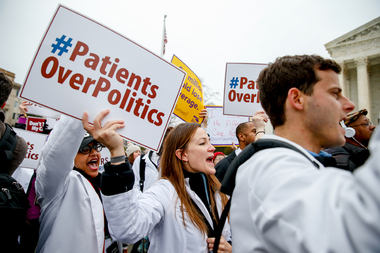Oklahoma will not help those who lose insurance subsidies

SEAN MURPHY, Associated Press
OKLAHOMA CITY (AP) — While the U.S. Supreme Court considers a key case related to the Affordable Care Act, officials in Oklahoma have taken little action to prepare for a ruling that could threaten the tax subsidies nearly 90,000 residents are using to purchase health insurance.
The nation's highest court is considering whether low- and moderate-income Americans still can receive federal tax subsidies to offset the cost of health insurance if they live in a state like Oklahoma that did not establish its own online insurance marketplace.
The nonpartisan Kaiser Family Foundation reports about 87,000 low- and moderate-income workers receive an estimated $18 million in federal tax subsidies to help pay for health insurance. The average tax credit is $209.
A ruling in the case is expected by the end of the month.
While the U.S. Supreme Court considers a key case related to the Affordable Care Act, officials in Oklahoma have taken little action to prepare for a ruling that could threaten the tax subsidies nearly 90,000 residents are using to purchase health insurance.
In the case, King v. Burwell, the nation's highest court is considering whether low- and moderate-income Americans still can receive federal tax subsidies to offset the cost of health insurance if they live in a state like Oklahoma that did not establish its own online insurance marketplace, or exchange.
In Oklahoma, more than 87,000 low- and moderate-income workers receive an estimated $18 million in federal tax subsidies to help pay for health insurance, with the average enrollee receiving a tax credit of about $209, according to the nonpartisan Kaiser Family Foundation, a clearinghouse for information on the health care system. If the subsidies were not available, the foundation reports the average health care premium would increase by about 243 percent.
Because Oklahoma opted not to create a state exchange where residents could shop for health insurance, Oklahomans instead purchased their plans through a federal exchange, but opponents who are challenging the law, including Oklahoma Attorney General Scott Pruitt, argue the law only allowed for the subsidies through state exchanges.
Pruitt maintains that if the Supreme Court strikes down the requirement that employers provide health insurance and that individuals obtain it, the cost of health insurance will plummet and the need for subsidies will diminish.
A ruling in the case is expected by the end of the month.
While Gov. Mary Fallin, a longtime critic of Obamacare, has met with her top health care advisers to discuss options if the court rules against the subsidies, her spokesman Alex Weintz says the solution to that problem should come from Congress.
"While there are a number of options open to states, the fact of the matter is the issue at hand is federal subsidies handed out by the federal government," Weintz said in a statement. "Ultimately Congress and the president — or the next president — are going to have to fix the mess created by Obamacare.
"It is unrealistic to expect Oklahoma, or any other state, to fill the void left by the unraveling of the ACA."
U.S. Rep. Tom Cole, a member of both the Appropriations and Budget committees, said key Republican leaders in Congress have been working for months on an alternative if the subsidies are shot down that would allow those receiving subsidies to continue to receive them.
"I think there is a strong consensus that the people on the exchanges not just be pitched out," Cole said.
While he hasn't seen the specifics of the plan, Cole said it's likely to include a block-grant program in which the amount of the subsidies would be offered to individual states, which could design their own programs for providing health insurance. But whether such a plan could pass a Republican-controlled Congress is difficult to predict, Cole said.
"The politics are challenging," Cole said. "You have to get 218 votes, mostly from our own ranks, and you've got some folks that when you mention Obamacare you are waving the red flag in front of the bull. They're not likely wanting to be seen saving it in any way, shape or form."
U.S. Sen. Jim Inhofe says he expects the Supreme Court will determine the subsidies are illegal and that he plans to cosponsor a Senate bill that would ensure anyone who would lose their tax credits continue to receive the subsidy through August 2017.
"In preparation for such a decision, I have supported legislation in the Senate that would help to protect the 90,000 Oklahomans that would lose their subsidy under the SCOTUS ruling," Inhofe said in a statement.
Still, the Supreme Court could reject the challenge and determine the subsidies in non-exchange states are legal, a ruling that would be a major victory for President Obama and the Affordable Care Act, said Elizabeth Carpenter, a director for Avalere, a Washington, D.C.-based health care consulting firm.
"The debate over the law will likely continue, both in Congress and as part of the 2016 presidential race, but certainly this kind of returns ACA implementation to the status quo," Carpenter said.
___
Follow Sean Murphy at www.twitter.com/apseanmurphy
Copyright 2015 The Associated Press. All rights reserved. This material may not be published, broadcast, rewritten or redistributed.





